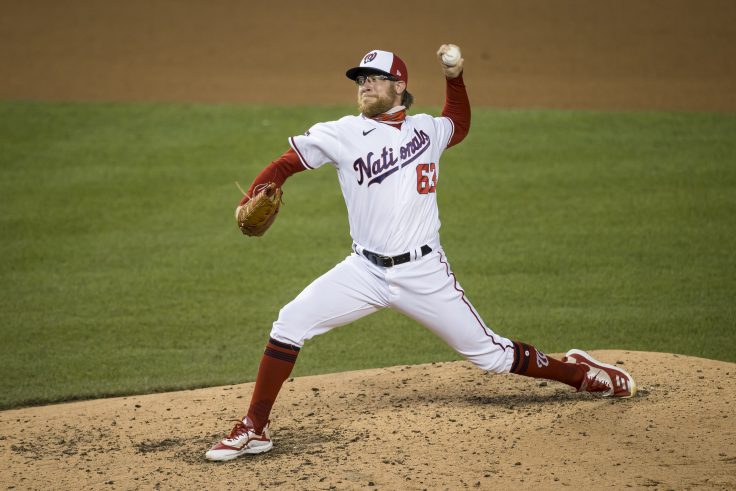No sport is as over-intellectualized as baseball. It’s the favorite pastime not only of America but also of America’s writers. Perhaps it’s the wealth of data, the length of the season, the nuances of the craft that invite curiosity, inspire comment, and engender lyricism. Whatever the reason, scribblers can’t stay away. Red Smith, Tom Verducci, Roger Angell, Thomas Boswell, George Will, David Halberstam, Michael Lewis, Charles Krauthammer—the pantheon of baseball laureates is grand. And imposing. Lesser pundits are wise to avoid the subject.
I’m going to write about it anyway. Not because I have special insight. Far from it: My running commentary as I watch the Nationals on television is limited to "nice hit" and "great catch" and—most pathetic of all—"wow." Nor am I the sort of fan who goes to every home game. Having two kids under the age of seven is something of a constraint. When we do make it to Nationals Park, more time is spent visiting the concessions, playground, gift shop, and restrooms than our seats. As for my ability to keep track of statistics, the less said the better. Numbers are not a personal strength. My six-year-old and his seven-year-old cousins put me to shame.
It is the abnormality of this season that makes it worth opining on. Baseball arrives at the very moment when America most needs a pick me up. A resurgent pandemic, economic depression, lawlessness in Portland and Chicago, widespread school closures, a bitter election, and increased tensions with China contribute to the sense that things are out of control. What a relief to spend a few hours each day in blissful ignorance of world events, consumed instead by a perfectly delivered change-up, a risky late-innings pitching change, or a walk-off home run. With the days of Tiger King and The Last Dance long past, and the release of summer blockbusters such as Tenet and Black Widow delayed until the future, only sports can leaven our national life with entertainment and novelty.
The uniqueness of each game is key. For all of the chaos that followed the spread of the coronavirus, for most individuals everyday life since March has been rather monotonous. The days have had a tendency to run together. Wake up, work, eat, get disgusted by the news, drink, sleep, repeat. Kids have no school, no camp, no jobs.
Sports bring contingency. They thrive on randomness. Each game has the one unexpected play, the soul-crushing unforced error, and the amazing and incongruous event that makes it special. They are moments worth savoring.
The daily matchups and results anchor us in time. Even a 60-game schedule provides fixed reference points—Opening Day, the playoffs, a World Series—that set themselves apart from the indistinct and blurry morass of illness, unemployment, disconnection, civil strife, and social vituperation that has characterized the last four months. (Has it been only four? God help us.)
The rituals of sports can be more satisfying than Zoom happy hours. They also can be healthier. "Sports are our brotherhood with ancient and medieval times," wrote the theologian Michael Novak (1933-2017) in The Joy of Sports (1976). "Sports are religions of place, of particulars, of deeds done here and at a concrete hour." How good to have them back.
And how promising. This year has been a master class in government failure. Authorities at the federal, state, and local levels botched the coronavirus response. Mayors across the country decided to live with vandalism, arson, and crime rather than risk confrontations between protesters and local police. The tragic combination of diffidence and imperiousness that defines America’s leaders produced political, economic, and social outcomes that will haunt us for years. Paralyzed by fear, large numbers of elites have simply thrown up their hands.
What's needed is creative thinking. And a willingness to settle for half-measures. If we can’t have all of our normal routines back, let’s at least reclaim some of them. In early July, Nats left-hand relief pitcher Sean Doolittle said that "Sports are like the reward of a functioning society." He was incorrect. Sports aren't a reward. They are second nature. They are as much a sign of a functioning society as work, school, churchgoing, and family and associational life. To allow the coronavirus to rob us of all these institutions is worse than self-defeating. It is appeasement.
Which is why the return of baseball, and soon of basketball and hockey, is worth celebrating. The financial, organizational, medical, and logistical obstacles the leagues surmounted in resuming their seasons have been incredible. No doubt there will be setbacks and surprises, drama and defeat. These are the things that attract us to professional sports in the first place. At least the major leagues are trying to subvert the idea that life in suspended animation must continue indefinitely.
The beginning of a baseball season, even a shortened one, brings to mind its end. Every year I look forward to October when the air cools and the leaves change and baseball and football and basketball overlap. Imagine how glorious the fall will be this year, when scientists announce they have a vaccine on the same day that the Nationals repeat.
A guy can dream, can’t he?
